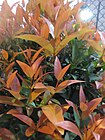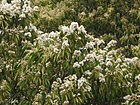Note: This is a project under development. The articles on this wiki are just being initiated and broadly incomplete. You can Help creating new pages.
Syzygium zeylanicum
Syzygium zeylanicum is an evergreen tree that can grow 12 - 20 metres tall. The bole is up to 40cm in diameter. The tree is sometimes harvested from the wild for local use as a dye and as a source of wood.[1]
Contents
- 1 Uses
- 2 Parts Used
- 3 Chemical Composition
- 4 Common names
- 5 Properties
- 6 Habit
- 7 Identification
- 8 List of Ayurvedic medicine in which the herb is used
- 9 Where to get the saplings
- 10 Mode of Propagation
- 11 How to plant/cultivate
- 12 Commonly seen growing in areas
- 13 Photo Gallery
- 14 References
- 15 External Links
Uses
[[:Category:Ayurvedic Herbs known to be helpful to treat |]], [[:Category:Ayurvedic Herbs known to be helpful to treat |]], [[:Category:Ayurvedic Herbs known to be helpful to treat |]], [[:Category:Ayurvedic Herbs known to be helpful to treat |]], [[:Category:Ayurvedic Herbs known to be helpful to treat |]], [[:Category:Ayurvedic Herbs known to be helpful to treat |]], [[:Category:Ayurvedic Herbs known to be helpful to treat |]], [[:Category:Ayurvedic Herbs known to be helpful to treat |]], [[:Category:Ayurvedic Herbs known to be helpful to treat |]], [[:Category:Ayurvedic Herbs known to be helpful to treat |]], [[:Category:Ayurvedic Herbs known to be helpful to treat |]].[2]
Parts Used
[[:Category:Herbs with used in medicine|]], stem, leaves, Root.
Chemical Composition
It contains Crude extract of leaf showed a total of 24 compounds among which 4-(4 ethylcyclohexyl)-1-pentyl-Cyclohexene (24.07 %) followed by Linoleic acid (15.16 %), 2,6,10,- 14,18-Penta-methyl-2,6,10,14,18-eicosapentaene (10.27 %), 9,17-Octadecadienal,(z)- (9.96 %), Z,E-3,13-Octadecadien-1-ol (7.14 %) and 7-Pentadecyne (7.36 %) are the major constituents (Table 1).[3]
Common names
| Language | Common name |
|---|---|
| Kannada | ಗುಡ್ಡ ನೇರಳೆ Gudda nerale |
| Hindi | |
| Malayalam | Kaattuvazhana |
| Tamil | |
| Telugu | |
| Marathi | Bhedas |
| Gujarathi | |
| Punjabi | |
| Kashmiri | |
| Sanskrit | |
| English | Spicate Eugenia |
.[4]
Properties
Reference: Dravya - Substance, Rasa - Taste, Guna - Qualities, Veerya - Potency, Vipaka - Post-digesion effect, Karma - Pharmacological activity, Prabhava - Therepeutics.
Dravya
Rasa
Guna
Veerya
Vipaka
Karma
Prabhava
Habit
Identification
Leaf
| Kind | Shape | Feature |
|---|---|---|
Flower
| Type | Size | Color and composition | Stamen | More information |
|---|---|---|---|---|
| {{{5}}} |
Fruit
| Type | Size | Mass | Appearance | Seeds | More information |
|---|---|---|---|---|---|
Other features
List of Ayurvedic medicine in which the herb is used
Where to get the saplings
Mode of Propagation
How to plant/cultivate
Commonly seen growing in areas
Woodland margins, Mixed deciduous and evergreen forests.
Photo Gallery
References
- ↑ Introduction
- ↑ Indian Medicinal Plants by C.P.Khare
- ↑ Chemical constituents
- ↑ Local names
- ↑ Cite error: Invalid
<ref>tag; no text was provided for refs namedLeaf - ↑ [Cultivation]
External Links
- Pages with reference errors
- Ayurvedic Herbs known to be helpful to treat
- Herbs with used in medicine
- Herbs with stem used in medicine
- Herbs with leaves used in medicine
- Herbs with Root used in medicine
- Herbs with common name in Kannada
- Herbs with common name in Malayalam
- Herbs with common name in Marathi
- Herbs with common name in English
- Habit - Evergreen tree
- Index of Plants which can be propagated by Seeds
- Herbs that are commonly seen in the region of Woodland margins
- Herbs that are commonly seen in the region of Mixed deciduous and evergreen forests
- Herbs





